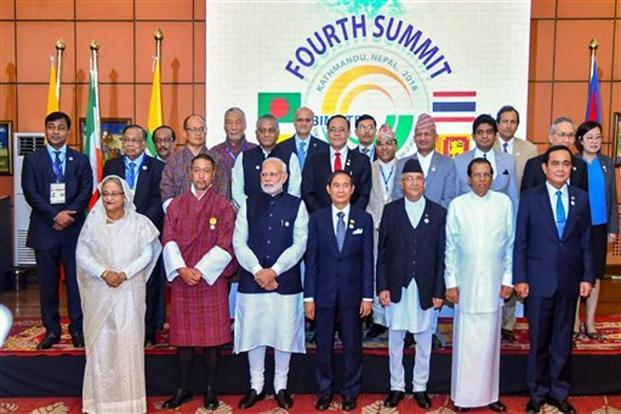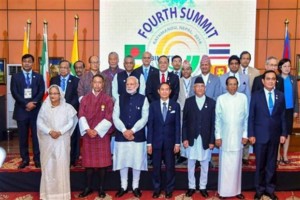

KATHMANDU: BIMSTEC nations, including India, today called for an early adoption of the master plan on transport connectivity in the region to achieve enhanced linkages and sustainable development. The call came at the conclusion of the 4th Bay of Bengal Initiative for Multi-Sectoral Technical and Economic Cooperation (BIMSTEC) Summit here with the adoption of an 18-point Kathmandu Declaration.
Prime Minister Narendra Modi, who attended the summit, had yesterday made a strong pitch for enhanced regional connectivity. The member nations in the declaration underlined the importance of multidimensional connectivity, which promotes synergy among connectivity frameworks the region, as a key enabler to economic integration for shared prosperity.
They reiterated their resolve to establish seamless multi-modal transportation linkages and smooth, synchronized and simplified transit facilities through the development, expansion and modernization of highways, railways, waterways, sea routes, airways in the region. They also reiterated their resolve to speed up their efforts to conclude the BIMSTEC Coastal Shipping Agreement and the BIMSTEC Motor Vehicle Agreement as early as possible taking into account the special circumstances and needs of the member states.
They noted with satisfaction the preparation of the draft BIMSTEC Master Plan on Transport Connectivity and called for its early adoption. BIMSTEC nations also thanked the Asian Development Bank for providing support to prepare the Master Plan and task the BIMSTEC Transport Connectivity Working Group (BTCWG) to work out the modalities for its implementation, giving due attention to the special circumstances and needs of the member states, annex to the declaration said.
“We agree that the Master Plan would serve as a strategic document that guides actions and promotes synergy among various connectivity frameworks, such as the ASEAN Master Plan on Connectivity 2025 (MPAC 2025), the Ayeyawady – Chao Phraya- Mekong Economic Cooperation Strategy (ACMECS), to achieve enhanced connectivity and sustainable development in our region,” BIMSTEC nations said. They also decided to establish a Working Group to deal with information technology and communications related matters with a view to provide greater access, more affordable and high-speed internet and mobile communications to the peoples of the region.
The member nations welcomed India’s offer to host a BIMSTEC Ministerial Conclave at the India Mobile Congress 2018 being held in New Delhi from October 25-27. Nepal Prime Minister K P Sharma Oli, who is the current chair of the grouping, said connectivity of infrastructure and industries and connectivity of markets and minds could unleash multiplier effects igniting innovation, spurring growth and propelling progress.
“I underline the importance of developing and operational sing a Buddhist Circuit in the region to promote connectivity and tourism,” Oli said. The leaders agreed to take concrete measures to facilitate tourism by ensuring safety and security of tourists, and smooth transport connectivity.
They also reaffirmed their commitment to developing and promoting Buddhist Tourist Circuit, Temple Tourist Circuit, ancient cities trail, eco-tourism and medical tourism. The leaders of the grouping recognized the high potentials of energy resources in the region, particularly renewable and clean energy sources, and agreed to expedite their efforts to develop a comprehensive plan for energy cooperation by working closely with each other within the region.
They also decided to constitute an intergovernmental group of experts to enhance energy cooperation including in hydro-power and other sources of renewable energy. They also welcome the signing of the Memorandum of Understanding on BIMSTEC Grid Interconnection.
The MoU provides for optimization of using energy resources in the region & promotion of efficient & secure operation of power system, among other things. The BIMSTEC leaders said they would instruct the relevant agencies to take concrete measures to initiate harmonization of technical, planning and operational standards for removing barriers to grid interconnections and also ensure early establishment of a BIMSTEC Grid and call for an early operationalization of the BIMSTEC Energy Centre in order to strengthen energy cooperation in the region. PTI





